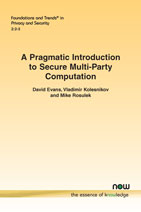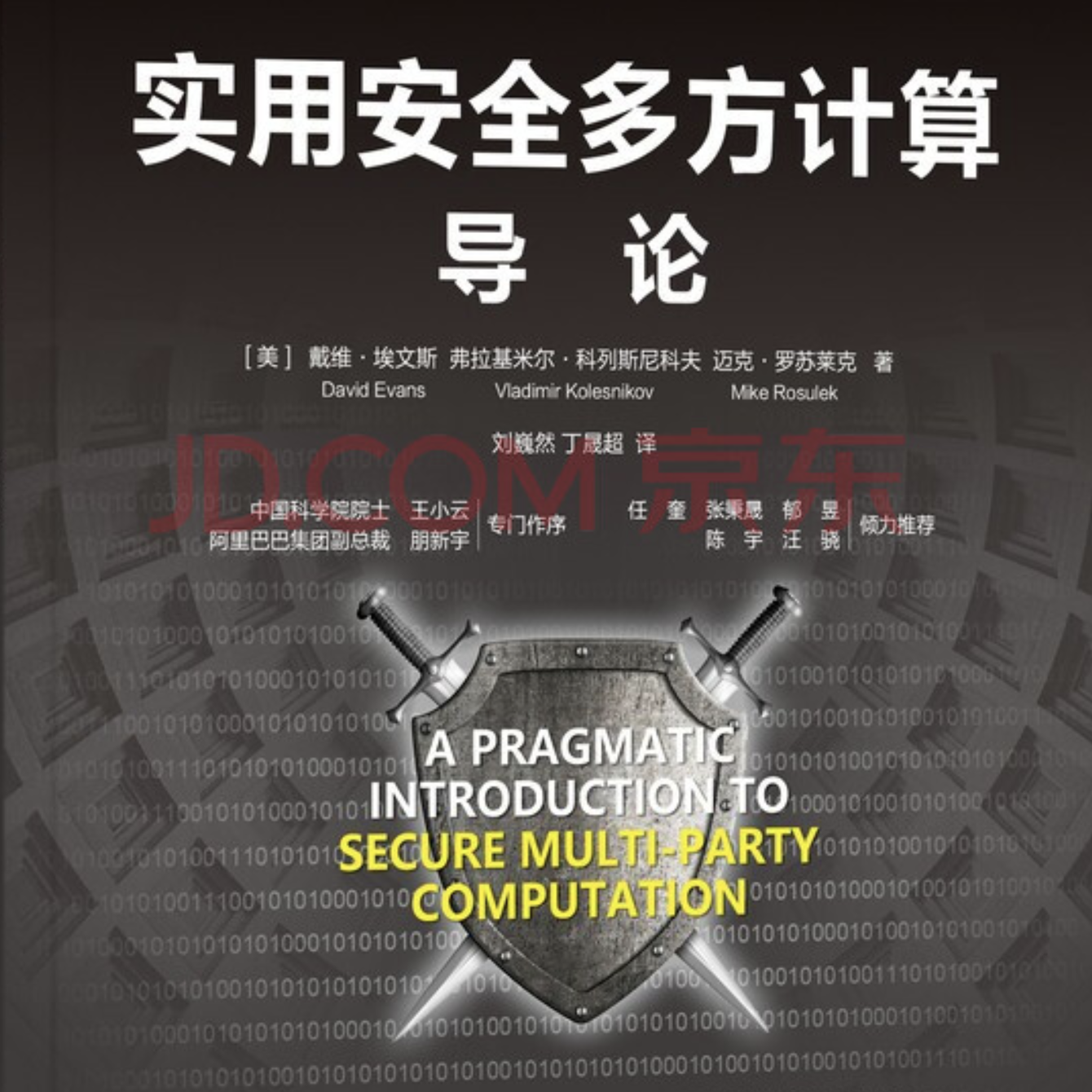A Pragmatic Introduction to Secure Multi-Party Computation
1/Jan 0001
A Pragmatic Introduction to
Secure Multi-Party Computation
David Evans, Vladimir Kolesnikov and Mike Rosulek
 Secure multi-party computation (MPC) has evolved from a theoretical
curiosity in the 1980s to a tool for building real systems today. Over
the past decade, MPC has been one of the most active research areas in
both theoretical and applied cryptography. This book introduces
several important MPC protocols, and surveys methods for improving the
efficiency of privacy-preserving applications built using MPC. Besides
giving a broad overview of the field and the insights of the main
constructions, we overview the most currently active areas of MPC
research and aim to give readers insights into what problems are
practically solvable using MPC today and how different threat models
and assumptions impact the practicality of different approaches.
Secure multi-party computation (MPC) has evolved from a theoretical
curiosity in the 1980s to a tool for building real systems today. Over
the past decade, MPC has been one of the most active research areas in
both theoretical and applied cryptography. This book introduces
several important MPC protocols, and surveys methods for improving the
efficiency of privacy-preserving applications built using MPC. Besides
giving a broad overview of the field and the insights of the main
constructions, we overview the most currently active areas of MPC
research and aim to give readers insights into what problems are
practically solvable using MPC today and how different threat models
and assumptions impact the practicality of different approaches.
NOW Publishers, December 2018: Publishers Page
Full Text (PDF) (Last update: 11 June 2022; Errata) (scroll down for links to PDFs of individual chapters)
News
May 2022: Lúcás Meier includes Pragmatic MPC in his list of Some Cryptography Books I Like:
I read this one quite recently, and I’d highly recommend it. ... I highly recommend this book if you’re interested in MPC. It’s also a short read, so if you’re not interested in MPC, you should still give it a look, and you might change that.

June 2021: A Chinese translation of the book is now available from China Machine Press!
Thanks to Weiran Liu and Sengchao Ding for all the work they did on the translation (which also substantially improve the English version with all the mistakes they found in their careful translation work).
To order: JD.com book link
January 2021: For a quick introduction to MPC, read Yehuda Lindell’s article: Secure Multiparty Computation (Communications of the ACM, January 2021). There’s even a movie:
Contents
Adoptions
We are aware of parts of this book being used in the following courses:
Jonas Spenger has notes from an MPC study group that follows some parts of the book including Yao’s Garbled Circuits, BGW Protocol and Beaver Triples, Malicious BGW and SPDZ, GMW Protocol, Oblivious Transfer Extension, and more.
Boston University CS 791/JD 673 / UC Berkeley CS 294, Law for Algorithms
Ran Canetti (BU CS), Stacey Dogan (BU Law), Aloni Cohen (BU CS & Law), Shafi Goldwasser (UC Berkeley CS), Frank Partnoy (UC Berkeley Law)
Brown CS 2950, Topics in Applied Cryptography: Crypto for Social Good
Seny Kamara
EURECOM Spohis Antipolis, Multiparty Computation and Blockchains (Fall 2022)
Antonio Faonio
George Washington University GWU CSIC 3907-83/6907-81, Advanced Cryptography
Arkady Yerukhimovich
IT University of Copenhagen, Cryptographic Computation and Blockchain (Spring 2023)
Bernardo Machado David
Stanford CS 355, Topics in Cryptography
Saba Eskandarian, Dima Kogan, and Florian Tramèr
University of Bern and Swiss Joint Master in Computer Science,
Cryptographic Protocols/Cryptographic Protocols
Christian Cachin
University of Maryland, CMSC 858T — Introduction to Secure Distributed Computation
Jonathan Katz
University of Missouri, CMP_SC 8001 — Wei Jiang has shared slides he developed for his course following the book:
- 1. Introduction
- 2. Defining SMC
- 3-1. Fundamental MPC Protocols
- 3-2. Fundamental MPC Protocols
- 3-3. Fundamental MPC Protocols
University of Vermont, UVM CS 295/395: Secure Distributed Computation
Joe Near
If you know of other courses using the book, please let me know.